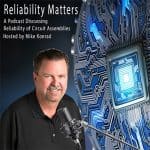
Weibull Probability Plotting
How to learn more by just looking!
podcast episode with speaker Chris Jackson
If you are a reliability engineer – chances are you have done a Weibull plot. You take something like failure data, put it into a piece of software, and presto! [Read more…]












 Ask a question or send along a comment.
Please login to view and use the contact form.
Ask a question or send along a comment.
Please login to view and use the contact form.